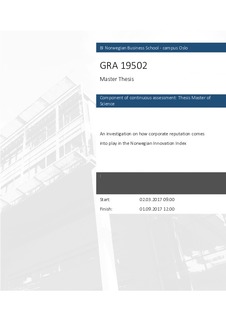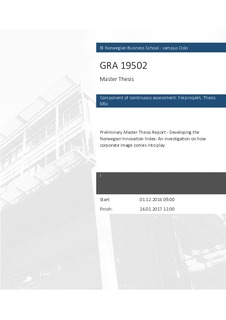| dc.description.abstract | The importance of corporate reputation has been growing over the last decades,
with CEOs consistently ranking corporate reputation as a firm’s most critical key
intangible resource (Hall, 1993). On a parallel and similar development, the topic
of innovation has also grown to become a major focus on the agendas of CEOs,
with innovation deemed necessary to offer companies a sustainable competitive
advantage (Lawson and Samson, 2001). While the financial impact of corporate
reputation and innovation have been well documented in the literature, research
on the linkages between innovation and corporate reputation has been limited.
Moreover, existing measures of innovation typically adopt methodologies on the
national or firm level and do not take into account consumer perceptions in their
calculations, even though it is consumers and not firms that are the best judges of
the value created by innovation (Andreassen, Kurtmollaiev and Lervik-Olsen,
2016; Andreassen, Kurtmollaiev and Lervik-Olsen, 2017).
In aiming to fill the gap in the literature, this study draws inspiration from the
Norwegian Innovation Index (NII) in Andreassen et al. (2016) and Andreassen et
al. (2017), an innovation index measured through the perspective of customers.
We seek to expand the framework and introduce a new independent variable,
corporate reputation, to form the conceptual model, used to investigate our
research question of how corporate reputation influences perceived relative
attractiveness, perceived firm innovativeness and customer loyalty.
Using a quantitative, cross-sectional research design surveying 206 consumers of
Norwegian retail banks and subsequently employing a PLS-SEM path modelling
technique using SmartPLS for analysis, the findings reveal a surprising negative
relationship between corporate reputation and perceived firm innovativeness by
consumers. In contrast, corporate reputation positively affects perceived relative
attractiveness and customer loyalty, highlighting the importance of a strong
corporate reputation. Finally, the positive effect of customer satisfaction on
perceived firm innovativeness underscores the importance of introducing
innovations targeted at addressing actual customer needs and generating customer
satisfaction. | nb_NO |

